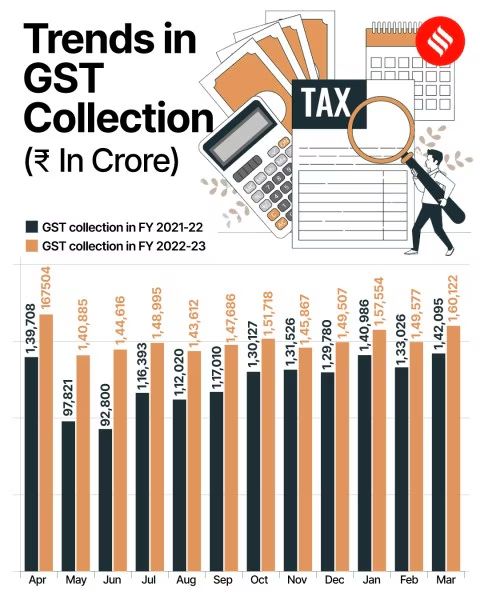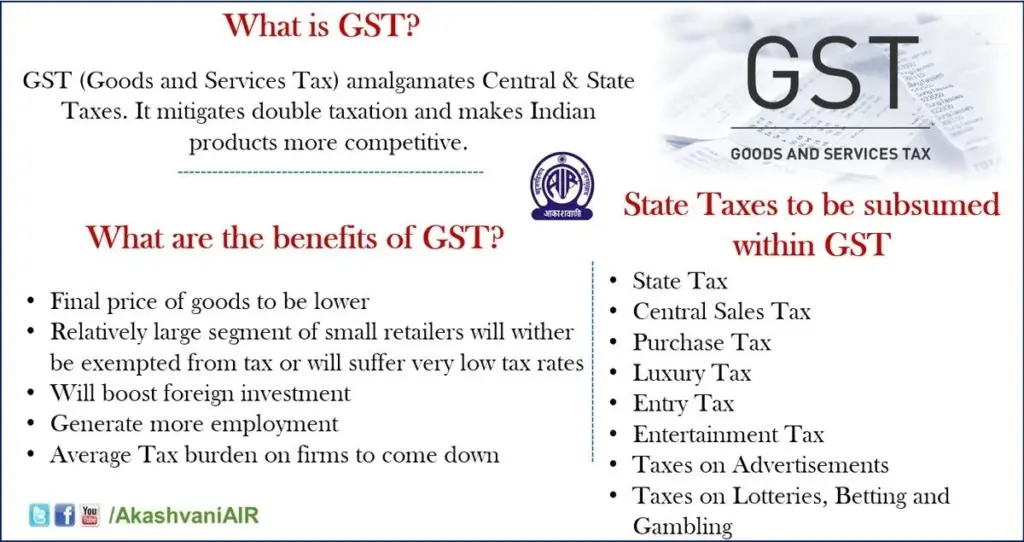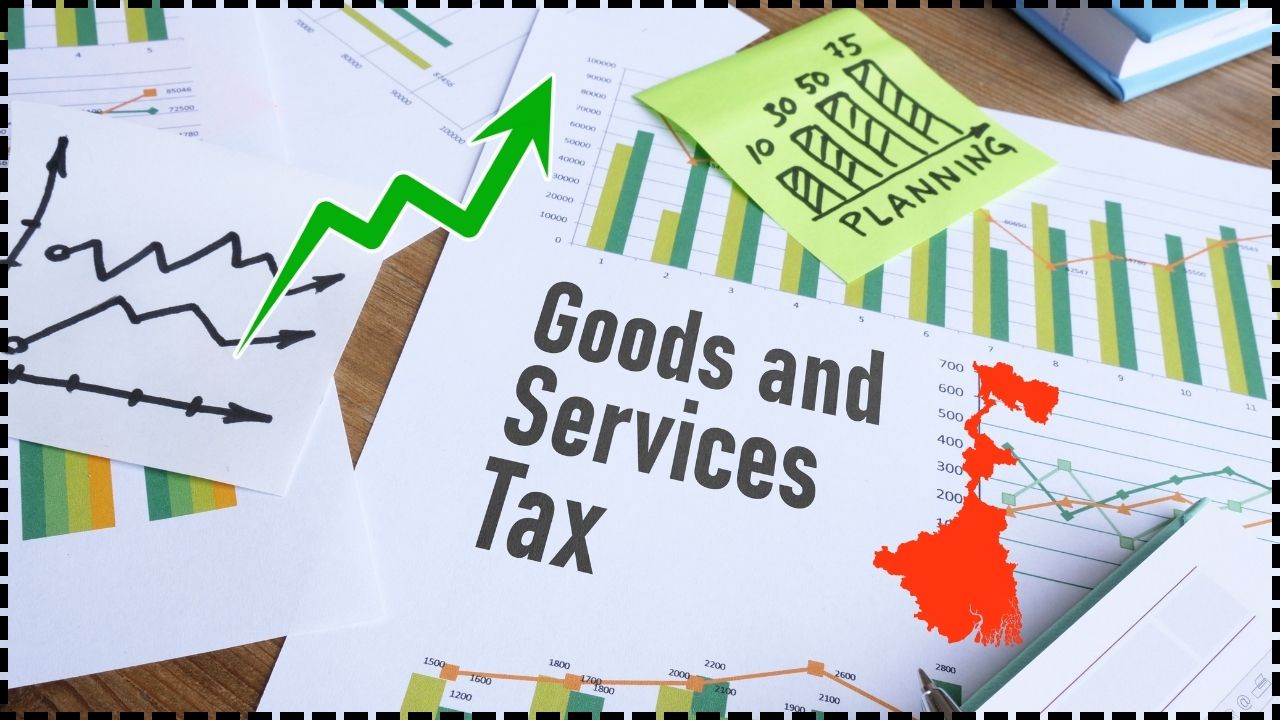
UP’s GST Bounce in July: In July 2025, Uttar Pradesh (UP) reported a 7% year-on-year increase in Goods and Services Tax (GST) collections. On the surface, that sounds like good news. But one good month doesn’t change a year’s worth of slow revenue growth. The reality? That July bounce may feel like a breath of fresh air, but it’s not strong enough to bring UP’s overall financials into the green. GST collections are a key indicator of a state’s economic health. They show how much people are spending, how businesses are producing, and how active trade and consumption are. When a major state like UP is struggling to grow its GST base consistently, it raises red flags about broader economic momentum and fiscal planning. Let’s break this down — what happened in July, why it isn’t enough, and what can be done to address the issue going forward.
UP’s GST Bounce in July
Uttar Pradesh’s 7% GST growth in July 2025 is a positive signal, but not a game-changer. The state still faces a deficit in its fiscal growth trajectory for FY25. Without consistent momentum, structural reform, and tighter refund controls, this bounce risks becoming just another statistical blip. For businesses, it’s time to step up compliance and digital adoption. For the state, it’s time to push forward with policy-driven expansion and smart tax governance. Only then can the red turn into black — not just for one month, but for the full year.
| Topic | Details |
|---|---|
| Keyword | UP’s GST Bounce in July Can’t Save the Year From Going Red |
| UP’s July GST Growth | 7% YoY |
| July 2025 India GST Collection | ₹1.96 lakh crore — up 7.5% YoY |
| Total Net GST (Apr–Jul FY26) | ₹7.11 lakh crore — up 8.4% YoY |
| Refunds in July 2025 | ₹27,147 crore — up 66.8% YoY |
| UP’s Gross GST in July 2025 | ₹9,760 crore (↑ from ₹9,125 crore in July 2024) |
| Concern | One-month growth can’t offset sluggish Q1 numbers |
| Historical UP GST Growth | FY23: ₹1.01 lakh crore, FY24: ₹1.13 lakh crore |
| Source | GST Official Portal |
What is GST and Why It Matters?
The Goods and Services Tax (GST) is a unified indirect tax system in India. Think of it like sales tax in the U.S., but it applies to nearly everything — goods, services, digital products, and more. Instead of separate state and federal taxes, GST integrates them under one system.
Why is it important?
- It affects pricing, profits, and consumer behavior.
- It’s a major revenue stream for both state and central governments.
- It funds essential public services — schools, roads, health care, sanitation, and more.
So, when a state’s GST numbers are sluggish, that has consequences beyond spreadsheets. It affects jobs, infrastructure, and long-term growth.
India’s National GST Picture – July 2025
Nationally, India clocked in ₹1.96 lakh crore in gross GST revenue in July 2025 — a 7.5% jump from July 2024. This includes:
- ₹36,224 crore from Central GST (CGST)
- ₹45,716 crore from State GST (SGST)
- ₹95,174 crore from Integrated GST (IGST)
- ₹18,647 crore from Compensation Cess
But here’s the twist — refunds surged to ₹27,147 crore, a whopping 66.8% increase from last year. When you subtract that, net revenue growth drops to just 1.7% YoY.
From April to July 2025, the total gross GST collection was ₹8.18 lakh crore. After refunds, the net GST revenue stood at ₹7.11 lakh crore, reflecting an 8.4% YoY increase.
While these figures aren’t alarming, the rising refund claims are a trend that experts are watching closely. They often indicate issues like inverted duty structures or inefficiencies in processing.

Uttar Pradesh: One Good Month, But an Underwhelming Quarter
Let’s zero in on Uttar Pradesh.
In July 2025, UP reported ₹9,760 crore in GST revenue, up from ₹9,125 crore the same month last year. That’s a 7% year-over-year growth, placing it in the middle tier among Indian states.
However, in the April to June quarter, UP’s GST bounce was minimal — hovering below 3%. The state was underperforming while others like Madhya Pradesh (18%), Bihar (16%), and Tripura (41%) surged ahead.
That means July’s recovery, while welcome, is more like a one-off event — a bounce, not a trend.
Historical Context
| Fiscal Year | GST Revenue (UP) | YoY Growth |
|---|---|---|
| FY23 | ₹1.01 lakh crore | – |
| FY24 | ₹1.13 lakh crore | 11.8% |
| FY25 (April–July) | Lagging vs target | <5% estimated |
State-wise July 2025 GST Growth Comparison
| State | GST Growth (YoY) |
|---|---|
| Tripura | 41% |
| Meghalaya | 26% |
| Madhya Pradesh | 18% |
| Bihar | 16% |
| Tamil Nadu | 8% |
| Karnataka | 7% |
| Uttar Pradesh | 7% |
| Gujarat | 3% |
| Delhi | 2% |
| Mizoram, J&K | 0% or decline |
UP finds itself in the average-performing group — ahead of Gujarat and Delhi, but nowhere near the Northeast or MP.
Why the GST Performance Matters for UP’s Economy?
GST collections aren’t just technical figures. They’re tied to the real world — infrastructure, education, healthcare, and public employment. When a state underperforms in GST, it might face the following:
- Reduced capacity to fund new development projects
- Delays in executing welfare schemes
- Increased dependence on central transfers or borrowing
- Limited fiscal flexibility during emergencies
The state also loses credibility with investors and financial institutions when revenue growth stalls. It can impact future borrowing costs and investment inflows.
Why the UP’s GST Bounce in July Isn’t Enough?
A single month’s 7% growth is not a game-changer when the previous three months were near-stagnant. To change the overall fiscal trajectory, UP needs at least 8–10% monthly growth consistently for the rest of the year.
Moreover, high refund outflows dilute the effectiveness of gross GST growth. If refund claims are rising due to compliance issues or faulty invoice matching, that’s a structural problem the government needs to fix.

What Experts Are Saying?
“Uttar Pradesh is showing signs of recovery, but it’s uneven. July’s spike is helpful, but it can’t be used to hide the bigger issue — the need for continuous, broad-based GST expansion.”
— Prof. A.K. Mishra, Economist and Tax Policy Analyst, Lucknow University
“High refunds are becoming a recurring theme. That either signals high efficiency in refunds or increased claims due to rate mismatches and credit backlogs.”
— Deepa Nair, Director, Indian Tax Forum
Recommendations: How UP Can Improve Its GST Position
To avoid ending the fiscal year in the red, Uttar Pradesh needs a combination of policy action, digital adoption, and tighter compliance enforcement.
For the State Government
- Widen the tax net:
- Promote digital billing in Tier 2 and 3 towns.
- Offer incentives for voluntary registration.
- Strengthen GST compliance audits:
- Use AI-driven tools to detect mismatches and fraud.
- Increase field-level inspections in high-risk zones.
- Revisit refund processing:
- Cap excessive claims through real-time verification.
- Launch dedicated refund helplines for small businesses.
- Push for rate rationalization:
- Request GST Council to address inverted duty structures, especially in textile, fertilizer, and electronics.
For Businesses and Tax Professionals
- Ensure timely and accurate filings to avoid penalties or refund delays.
- Use accounting platforms like ClearTax, Zoho Books, or Tally Prime to automate reconciliations.
- Keep updated with CBIC notifications and GSTN portal updates.
Gauhati HC Rules GST SCN Invalid Without Personal Hearing Date
No GST on UPI Payments — Government Clears the Air in Rajya Sabha
GST Council Considers Amnesty That Could Save Small Businesses Lakhs in Penalties





